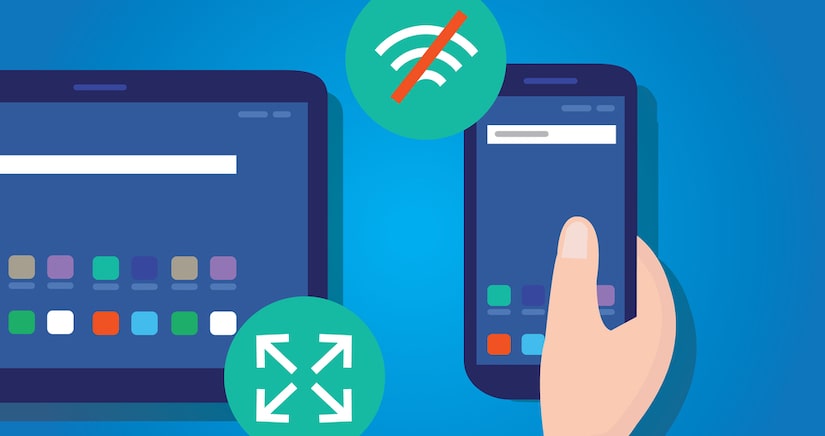We all remember a time when using your mobile device to browse websites was needlessly painful, slow, and kludgy. Whether it’s buttons that were too small to click or text that scrolled off the side of the screen, it’s a wonder that we didn’t all give up in a collective sigh of frustration.
Nowadays, it’s painless for users to access their favorite websites and interact with mobile content. For businesses of all sizes, it’s more important than ever to provide seamless, interruption-free access to content that’s primed for clients’ ease of use. These advancements have become possible with the invention of progressive web apps.
What is a Progressive Web App?
A progressive web app, or PWA, is a website that maintains the look and feel of a mobile application and delivers the speed, performance and responsiveness to improve mobile user experience. PWA offers an app-like browsing experience but it does not have to be submitted to an app store and users don’t have to download it like an app.
PWAs are dynamically responsive to the client’s specific browser, adapting to the features on any user’s device without generating any hiccups. In some ways, PWAs are extensions of traditional applications. With advancements in development technologies, users can install a web app on their home screen, receive push notifications and work offline. Whenever a user revisits a web app, he or she may be prompted to download the full app through their app store of choice.
Additionally, all PWAs are discoverable by major search engines since it is purely provided through hosted servers.
Why Use a Progressive Web App?
It’s been proven that progressive web apps help businesses increase conversions, page visits and session lengths.
Take a look at AliExpress – a popular e-commerce site. For years, AliExpress struggled to deliver an engaging user experience on mobile and covert mobile site users to app users. After replacing their mobile site with a PWA, the company saw a significant improvement in the overall performance of AliExpress’s website:
- 104% increase in conversions for new users
- 2x more pages visited per session
- 74% increase in time spent per session
Accessibility
During the last decade, most online interactions and monetary transactions have occurred on mobile devices. It’s vital for your company to create a mobile-first responsive experience that won’t frustrate or cause visitors to disengage.
As stated above, a major advantage of a PWA is that it requires absolutely no installation. The app is exposed to a much broader set of random visitors since it can be discovered online or in the app store for optional download. If you want to tailor your experience to both returning clients and new users, progressive web applications are a must.
Additionally, PWAs go above and beyond traditional websites. Using hardware integration, these applications feature fast loading offline modes and responsive behavior dependent on the client’s browser. Traditional sites operate on CSS, HTML, and JavaScript queries that stop functioning on underused browsers or regions with little internet service.
To put it simply, progressive web applications blend all the benefits of natively installed apps with browser-based discovery.
How Does a Progressive Web App Improve Load Time?
Speed is perhaps of the most important aspects of progressive web applications. Through providing significant responsive interaction over traditional sites, most PWAs are 43 percent faster than their browser-based counterparts.
Although it can seem like magic, PWAs function on the age-old logic of browser caching. When a client first visits your site, any metadata and loaded site data are automatically stored on the client’s device. The next time they visit, the cached (or stored) data is rendered several milliseconds faster.
Often, PWAs are paired with an Accelerated Mobile Page or AMP. To put it simply, AMPs are very bare-bones HTML pages that load much more quickly than bloated CSS-HTML queries. AMPs cut out all JavaScript, plugins, and certain HTML tags to appear in a clients’ search more quickly.
As you can likely guess, this leads to increased search engine optimization and improved client retention.
The Verdict
So, are progressive web applications here to stick around? The short answer: yes. Ultimately, the gains in client engagement and e-commerce platform performance are too good to pass up.
PWAs are simple to get started, culling the costs of traditional application development cycles. On average, a fully-fledged progressive web application can be launched in as little as twelve weeks. Through employing third-party software architecture platforms, all the nitty-gritty details of server sockets, HTTPS responses, and data caching are abstracted away from the business’ development team.
Utilizing an AMP, it’s easier than ever to get a fast, highly responsive, and platform-independent PWA launched in no time.






